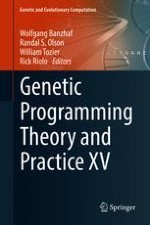2018 | OriginalPaper | Buchkapitel
2. Schema Analysis in Tree-Based Genetic Programming
verfasst von : Bogdan Burlacu, Michael Affenzeller, Michael Kommenda, Gabriel Kronberger, Stephan Winkler
Erschienen in: Genetic Programming Theory and Practice XV
Aktivieren Sie unsere intelligente Suche, um passende Fachinhalte oder Patente zu finden.
Wählen Sie Textabschnitte aus um mit Künstlicher Intelligenz passenden Patente zu finden. powered by
Markieren Sie Textabschnitte, um KI-gestützt weitere passende Inhalte zu finden. powered by
